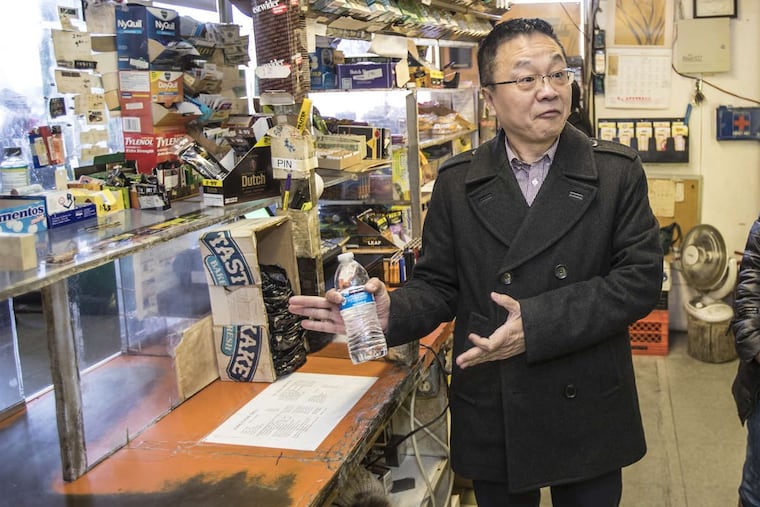Q. and A.: After Kenney signs controversial bill on beer delis, then what?
For beer deli owners, the future is uncertain. Besides wondering how they can maintain their businesses, they have been left to wonder whether they can keep intact their interior bullet-resistant barrier windows that many maintain in higher-crime neighborhoods. That issue won't be decided for at least several months.

Editor's Note: An earlier version of this article incorrectly reported that the city's Department of Licenses and Inspections would let proprietors know about the bill's new restaurant licensing requirements in the first few months of 2018. The article has been updated to say weeks, not months. Also, the second paragraph in the article was based on statements made by Councilwoman Cindy Bass.
Mayor Kenney is expected Wednesday to sign a controversial bill passed last week by City Council aimed at cracking down on stop-and-go stores, also known as beer delis.
The bill seeks to rid the city of the stores — which sell alcohol and at times have not complied with state laws — by transforming them into traditional restaurants; convenience stores, or takeouts that don't sell alcohol; beer distributors where alcohol consumption is prohibited; or closing them altogether.
For beer deli owners, the future is uncertain. Besides wondering how they can maintain their businesses, they have been left to wonder whether they can keep intact their interior bullet-resistant barrier windows, which many maintain in higher-crime neighborhoods. That issue won't be decided for at least several months.
So what happens next?
Karen Guss, spokeswoman for the Department of Licenses and Inspections, said Tuesday that the department would let proprietors know about the bill's new restaurant licensing requirements in the first few weeks of 2018. The new licensing categories would be implemented in the first four months of the year, she said.
In the summer at the earliest, she said, the city would convene a diverse group to discuss the polarizing issue of the barrier windows that separate store workers from customers in some establishments. "Certainly, we want affected businesses to be at the table," she said.
The Philadelphia Commission on Human Relations will "organize community conversations in neighborhoods affected to address tensions and to help build more positive relationships and stronger communities," the commission said in a statement Tuesday.
What does the bill say?
The bill, introduced Nov. 2 by Councilwoman Cindy Bass, separates food establishments into two categories: large and small. Large establishments would be required to have 30 or more seats and at least one easily accessible toilet for customers.
Bass' bill was aimed at stop-and-go outlets, where people can buy single cans of beer from early morning until late at night. She has said they encourage drunkenness, sell items for children like candy and chips next to alcohol for adults, and in some cases have flouted state requirements for food establishments selling alcohol. She has said the beer deli business model needs to end.
The controversial part of the bill originally called for a mandatory ban on any "physical barrier" between food servers and customers in large food establishments. (Any potential restrictions on barrier windows would not affect takeouts or other small food establishments that don't sell alcohol.)
Beer deli owners strongly oppose a ban on the thick plastic, bullet-resistant windows. Without the windows, they say, their lives would be at risk. They point out that banks, fast-food outlets, gas stations, and convenience stores have bullet-resistant partitions.
How was the bill amended?
On Dec. 4, Council's Committee on Public Health and Human Services amended the section on physical barriers to remove the mandatory ban and instead instructed L&I to issue by Jan. 1, 2021, regulations for "the use or removal of any physical barrier" in places that serve food and alcohol.
The amended bill was approved Dec. 14 in a 14-3 vote by the full Council.
What will happen to the beer delis?
After the Council committee vote, Bass said beer deli owners "need to decide what they want to be: Do you want to be a restaurant or a beer distributor?"
Beer delis currently have a "restaurant" or "eating place" license from the Pennsylvania Liquor Control Board, which allows them to sell certain types of alcohol. LCB rules also require them to have 30 seats and to prepare and serve food. Bass has pointed out that some have not complied.
If they want to continue to sell alcohol as a restaurant or eating place, under the new city law they would have to apply for a large food establishment license — and would be subject to whatever rules L&I issues on barrier windows in large establishments.
Adam Xu, chairman of the Asian American Licensed Beverage Association, which represents 245 beer delis in the city, said Monday that it was not clear what beer delis would decide, given the continued uncertainty over the window issue. If they opt for a large food establishment license, they eventually could be forced to remove their bullet-resistant windows and thus risk their safety.
Becoming beer distributors would have obstacles, too, including a difficult zoning-approval process, he said.
Meanwhile, State Rep. Todd Stephens, a Republican who represents part of Montgomery County, as he said he would at a Dec. 8 news conference, issued a memo last week to House colleagues seeking co-sponsors of a bill aimed at countering Bass' bill.
"My legislation will authorize employers to voluntarily create workplace violence prevention policies and/or implement safeguards for their employees (including the installation of barriers, security systems and other measures) – as long as those policies and safeguards are consistent with state and federal law," Stephens wrote in the memo. He noted that bullet-resistant barriers are listed in the U.S. Department of Labor Occupational Safety and Health Administration's workplace violence prevention recommendations for late-night retail establishments.
Stephens said he plans to introduce his legislation in January.